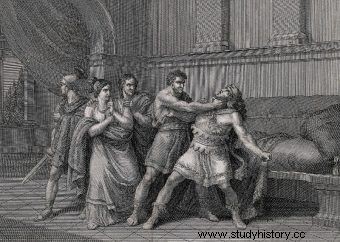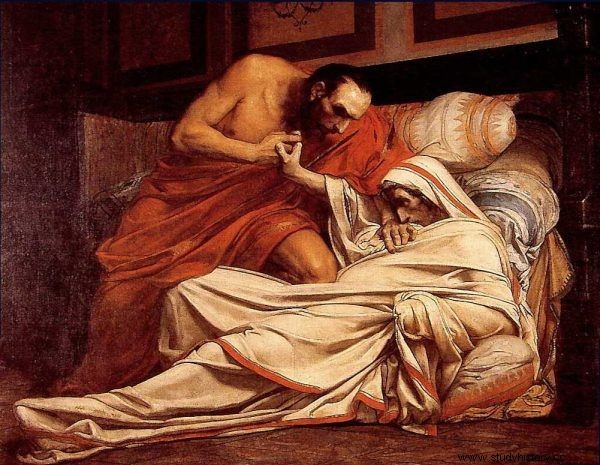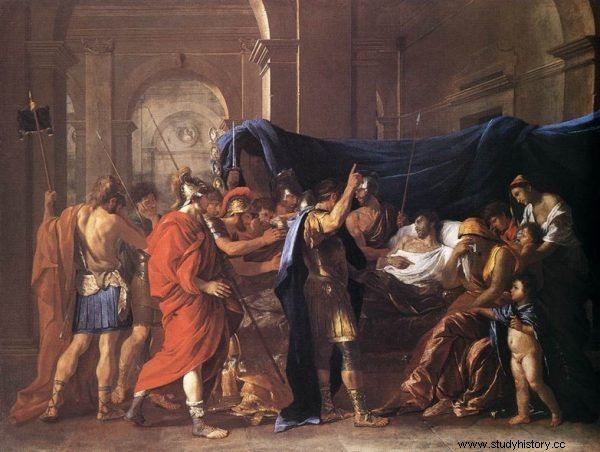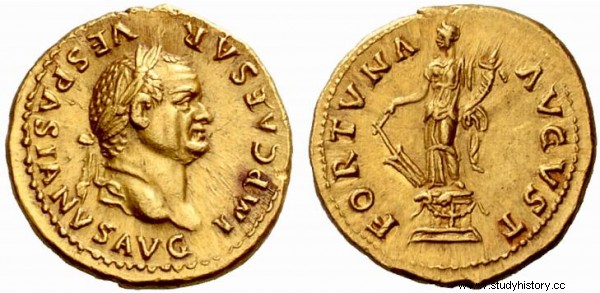It would seem that being a Roman emperor is a dream job, full of luxury and splendor. Maybe it was true, but for a detail
Between 27 BC and 476 AD (exactly 503 years), the Roman Empire was ruled by 77 emperors. According to statistics published in Acta Theologica Supplementum 7 , the average duration of each rule is just 7.8 years and the age at death is 48 years. This does not seem strange, after all, in ancient times hygiene and medicine were not at a very high level ... Were it not for the fact that as many as 50.6% of rulers died of natural causes!
Debunked as is tradition
In Ancient Rome, it appears that power was removed by force as part of a routine procedure. Poison, dagger, or maybe more fancy ways? This depended largely on the popularity of the ruler in question.
The long list of the murdered is opened by the famous Caligula, who was stabbed or stabbed with a sword - he was inflicted about 30 wounds (as for Octavian Augustus and Tiberius who ruled before, it is not certain whether they were killed by poison or disease). According to the common opinion, the madman deserved such a fate with his rule that were not only inept but also completely meaningless.

Less than half of the Roman emperors died naturally. What happened to the rest?
One of the last orders was to destroy some 2,000 confiscated merchant ships and build a road across the Gulf of Naples on them. Why? It was in response to the trick on the part of Tiberius that Caligula was "as fit for the emperor as the horses in his wagon for riding in the Bay of Baiae."
Caligula's successor, Claudius, was poisoned by Agrippina - his own wife , which previously secured Nero's right of succession. He, having taken power, proclaimed Claudius a god in a political gesture of "love for his father." However, he did not reign long and happily, as is well known, avoiding execution by suicide with the use of a dagger. Galba, proclaimed emperor while Nero was still alive by the army in Spain, did not manage to take his own life. After a short 7 months of reign, he was brutally murdered and decapitated by his own soldiers.

The causes of Tiberius' death remain unclear
Immediately after him, it was the turn of Otto, who committed suicide in the name of peace in the Empire - his reign lasted a record short time, only two months. Not much longer, only eight months, was the reign of Vitellius, whose death closes the unfortunate year of the four emperors. He, in turn, was captured and martyred by his adversaries led by Vespasian. The massacred body was thrown into the Tiber.
A dagger is the basis
As you can see, there was a clear trend among opponents of the government, consisting in liquidation with the use of white weapons. In later years, Domitian, Pertynax, Didius Julianus, Caracalla, Geta, Macrinus, Heliogabal, Alexander Severus, Maksymin Trak, Pupien, Baldinus, Gordian III, Trebonius, Emilius, Galien, Aurelian, Tacitus, Florian, died in the same way. Probus, Karinus, Numerian, Severus II, Konstans I, Gratian, Valentinian II, John the Usurpator, Valentinian III, Majorjan, Antemiusz and Julius Nepos. From this long list, many were demonstratively mutilated: the headless, naked bodies of Elagabalus and his mother were dragged through the streets of Rome and thrown into the river, the heads of Maximin Trak, his son and the ministers were impaled. Majorjana was beaten and tortured for five days before finally beheaded.
Sometimes only the blade was replaced with something else, such as a rope in the case of Licinius, or stones thrown from the walls at Petronius Maximus. The latter, in addition, was then torn to pieces and thrown into the Tiber .

Death of Germanicus
Poison was used relatively rarely. Among the rulers under consideration, only Claudius was certainly poisoned with the help of the mushroom dish. Some sources say that Maksymin Daya may have committed suicide by ingesting poison, but other historians have suggested that he died as a result of thyroid disease.
Nowadays, theories about poisonous water flowing through Roman aqueducts, in which critical concentrations of lead were supposed to be found, are being abandoned. Yes, many emperors died of unexplained causes, with symptoms of severe poisoning or illness, and it was possible that it was caused by eating tap water full of heavy metal. But given the frequent travel and unhealthy lifestyle of most rulers, disease or food poisoning could be an equally likely cause of death.
Prognosis:poor
Of course, the remaining 50% of Rome's rulers did not die of natural causes. Five were killed in battle These were Gordian II, Philip I the Arab, Decius, Constantine II, and Julian. The fate of Valerian I has not been fully known - it is only known that the Persian king Shapur took him prisoner and the news about the emperor is lost.
What about the rest? Diseases that we now consider harmless or easily curable had a great share in the mortality of emperors. For example, Vespasian died after an attack of… diarrhea. Septimius Severus died of chronic gout, and Tytus and Nerva were defeated by malaria. Many Caesars left this world as a result of unspecified diseases:they were, among others, Constantine, Flavius Honorius and Romulus Augustulus. The worst fate seems to have happened to Galerius, who most likely suffered from genital cancer combined with Fournier's gangrene, which was manifested by the slow dying of the skin of the scrotum and its vicinity.

Vespasian died after ... an attack of diarrhea
The most unlikely death, however, was the little-known Emperor Carus, who was struck by lightning during a war expedition . Nevertheless, he, too, should be counted among the rulers of the dead of natural causes. In total, this group includes as much as 32.5% of ancient chiefs.
As you can see, ruling Rome was associated with quite a high risk. At the same time, interestingly, according to the calculations of historians, the life expectancy of the emperor was the same as that of the average citizen of the Empire.
